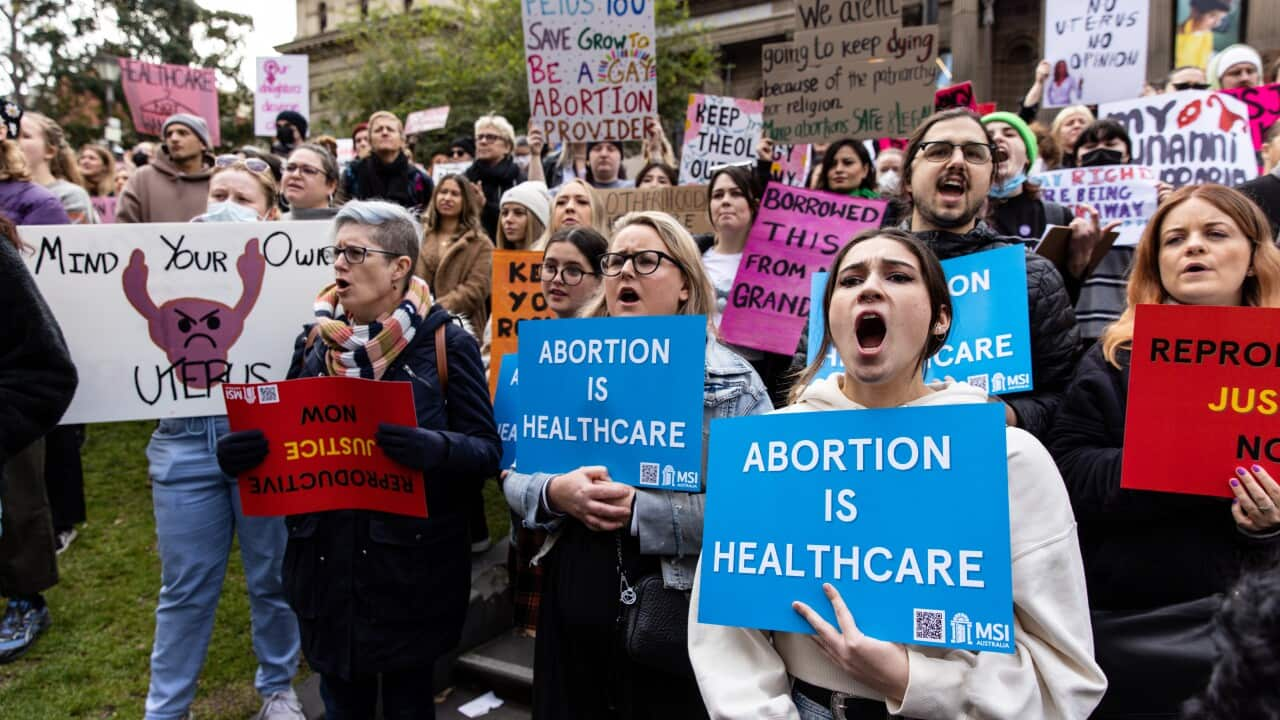Thousands of Australians are taking to the streets to protest a .
The blow dealt by the US Supreme Court limiting access to safe abortions has shone a light on the situation in Australia as protesters take to the streets in solidarity.
Thousands of abortion rights supporters marched in Melbourne and Sydney on Saturday, and in Brisbane and Adelaide on Friday, demanding free abortions and more accessibility to health services for women and pregnant people.
Protesters are also expected to voice discontent in Perth, Hobart, Wollongong and Rockhampton on Saturday, and in Launceston on Sunday.
The movement has been sparked by the Supreme Court decision to overturn Roe v Wade that has seen 27 US states move toward either banning or threatening to criminalise abortions.
While much of the attention is on America, there is still work to be done on abortion access at home, contraception and safe abortion providers, according to one of Australia's largest abortion providers, MSI Australia (Marie Stopes International Australia).
"The events taking place in the US are devastating for human rights," MSI managing director Jamal Hakim said at the Melbourne rally.
"Fortunately, we are not at risk of having abortion bans in Australia but we do need increased access and equity to abortion care services."
While the federal government supports abortion rights, people without access to public-funded services request financial support on a weekly basis, Mr Hakim said.
"In particular, people on temporary visas in Australia face extraordinary barriers to abortion care. Reproductive rights are about healthcare access for all, not for some."

Demonstrators hold placards and signs during a rally in support of abortion rights at the State Library of Victoria in Melbourne on Saturday. Source: AAP / DIEGO FEDELE/AAPIMAGE
"I flew in from Texas just before Roe v Wade was overturned and soon I will travel back to Texas where there is practically an outright ban on abortion," she said.
"Criminalising abortion doesn't stop abortions, it just forces people to access them illegally or travel long distances. It impacts people's mental health and increases fear."
At the Sydney rally, hundreds of people participated, despite the rain.
"I think the fact that people wanted to demonstrate in the pouring rain is a really good indication of where people are at in Australia, in the fight for our rights," Hersha Kadkol said.

Thousands of protesters rally in support of abortion rights at Sydney Town Hall on 2 July 2022. Source: AAP / Dean Lewins
"We want to say that abortion should be free, safe, legal, on demand and also without apology because of course in WA, you still have to ask permission from two doctors to get an abortion at all."
Mr Hakim said there were fears of "anti-abortion" sentiment being bolstered in Australia after the US Supreme Court ruling.
"What happened in the US is going to have an impact on every single woman and pregnant person across the world," he said.
"It means anti-choice movements will now be bolstered, they will be looking for ways to attack those fundamental rights."
Federal government vows to support access to abortion in Australia
Roe v Wade was a landmark 1973 decision by the US Supreme Court which established the constitutional right for women to have an abortion.
It was overturned by the conservative majority court last month, paving the way for US states to determine the legal status of abortion.
In Australia, abortion is under certain circumstances and when it is performed by a registered doctor.
However, there are different rules governing access to the procedure in each state and territory and continued barriers to access, particularly for those in regional and remote communities.
"These women are 1.4 times more likely to have an unintended pregnancy, and yet their access to abortion is substantially reduced because many of these surgical abortion services only exist in metropolitan centres," said Professor Kirsten Black, an academic gynaecologist from the University of Sydney told SBS News.
"Ensuring that abortion is available in public hospitals, I think would be a huge step towards making abortion equitable, particularly for women in rural and remote areas of Australia."
Federal health minister Mark Butler told SBS News: "While the laws relating to pregnancy termination are a state and territory responsibility, including the conditions for a termination to be performed, the Labor government is committed to ensuring access to sexual and reproductive health care."
Rachael Wong, chief executive of Women's Forum Australia, said abortion should not be used as a 'solution' to the inequalities women face.
"Often women seek abortion because they don’t feel they have any other choice," she told SBS News.

Thousands of pro-choice protesters gathered during a rally in support of abortion rights at Sydney Town Hall in Sydney on Saturday. Source: AAP / DEAN LEWINS/AAPIMAGE
Ms Wong said it was important to consider the welfare of both the mother and the unborn child.
"We're not campaigning to change laws, it's more about advocating for that support to be there for women so they don’t feel they have to have an abortion," she said.


